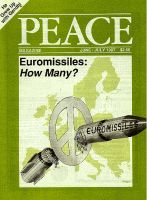
Peace Magazine Jun-Jul 1987, page 4. Some rights reserved.
Search for other articles by various here
As we follow the endless reports of the Iran/ Contra involvement with anticipated surprise, how many of us organize or demonstrate against the Iran /Iraq war or bring its massacre to public consciousness? The same question might be asked of the Soviet invasion of Afghanistan.
Why have we not addressed our-selves to the massive killing, the huge exodus, the homelessness? A third instance of neglect concerns the 1975 Indonesian invasion and occupation of East Timor (365 miles north of Australia). As many as a third of the 1975 population of 680,000 people have been murdered by the invading forces or have died as a consequence of the invasion. No conflict during the entire post-World War II period has been protested against as much as the Vietnam War, 1964 -- 1975. The subsequent Vietnam-Chinese war and mass murders by the Khmer Rouge prompted little active protest or lobbying. What about current fighting in Lebanon?
Why have there been so few meetings on these wars? Are we in the peace movement culture-hound? Can it be that we only protest conflict and injustice when they are perpetrated by countries with similar cultures to ours? Peace groups will need to be-come less culture-hound if they are to oppose wars of aggression everywhere. Indonesia's murderous attack on a country about which we know little is no less worthy of protest than the U.S. attempt to overthrow the government of Nicaragua.
Shloime Perel, Montréal
In the Soviet "reforms," led by Gorbachev, there are two trends, both connected. One is more tolerance of dissent and release of some dissidents. The other is the so-called introduction of "free enterprise." Gorbachev has risen as a leader whose function it is to blunt the hunger for democracy by throwing it a few bones. Too much reform, with socialist and public property still intact would ruin the justification and market for the arms race. In a moment of rare insight, Gorbachev said the West "does not fear Soviet nuclear missiles. But they do fear the extension of democracy in the USSR." Gorbachev has not moved toward Western economic thought at all, but simply sidestepped Stalin's infantile economics and gone (only partly) back to original socialist economic theory.
After the civil war following the Russian Revolution, Lenin's government introduced the New Economic Policy (1920s), in which the state retained ownership of the forests, mines, railways, heavy industry, and foreign trade. However, retail trade was permitted, farmers were able to sell produce in the open market and private enterprise was partially restored. We know what happened later when these changes were reversed.
Today it's one thing to finally fire the corrupt and wasteful managers; it's another to "fire up" the creative drive of working people. In the end, Gorbachev's reforms will fall short. Attempts to use disarmament proposals to take the strain off the USSR's economy will also fail because with-out continued mass pressure here, the West will not accept any reduction to its military establishment. Besides, the West's arms race has always been intended to act as an "anchor" pressure on the Soviet economy in order to then "prove" that "socialism can't work," and prevent Soviet economic advances.
Robert Fink, Saskatoon

Peace Magazine Jun-Jul 1987, page 4. Some rights reserved.
Search for other articles by various here